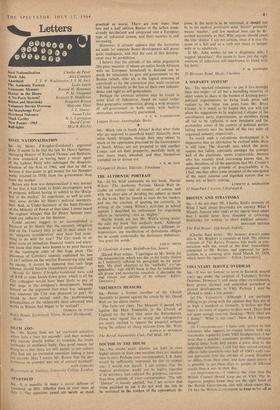% ma Letters Steel Nationalisation C'harles de Peyer Much Ado .
Alex corn! on Apartheid T. E. W. Waddington, J. S. M. Jack The Authentic Portrait Leslie Smith VeSinlents Measure Ronald H. Herrman Doctor in the House P. M. Sheppard A No-Party System? Kenneth R. Middleton Britten and Stravinsky Benjamin Britten Voluntary Service Overseas Malcolm Elliot Set Stonehenge Free! J. L. Shutter Overhead Nuisance S'usan Tylor Mark Gentler N. 1.. Carrington New Poems-1965 David Carver Bull-fights Miss B. Ritchie
STEEL NATIONALISATION
SK—Sir Henry d'Avigdor-Goldsmid's argument (July 3) seems to be that the late Sir Henry Spencer, managing director of Richard Thomas and Baldwins, is now unmasked as having been a secret agent Of the Labour Party who sabotaged the denation- alisation of his firm in 1960, and that he did so because it was easier to get money for his Newport Works (started in 1958) from the government than from the market.
Before any firm was denationalised it was normal to see that it had funds to finish development work in Progress, without having to submit to the 'discip- line of the market.' So experience, as well as com- mon sense, derides Sir Henry's political interpreta- tion. And, as Under-Secretary of the Steel Division Of the Ministry of Power at that time, I never heard the slightest whisper that Sir Henry Spencer exer- cised any influence on the decision.
Could anyone suggest to so accomplished a financier as Sir Henry that the statutory obligation laid on the Treasury only to sell its steel assets for an 'adequate consideration' may have had some- thing to do with the case? The City tends to set great store on immediate financial results and every- one knew that these were bound to be poor because of the running-in costs of this huge plant. The chairman of Colville's recently explained his loss of £4.7 million on the smaller Ravenscraig strip mill by saying, 'it cannot be expected that such large schemes should become immediately profitable.' .
Would Sir Henry d'Avigdor-Goldsmid have sold Off RTB at some knock-down price, which is all his City colleagues would have been likely to pay at that stage in the company's development, basing himself on the argument that what was 'adequate' Was whatever the City was prepared to pay? Or Would he have waited until the profit-making potentialities of the technically most advanced steel Works in Britain had begun to be realised?
























 Previous page
Previous page